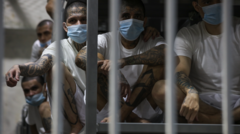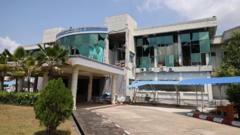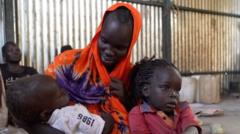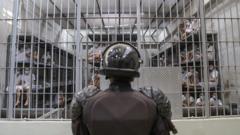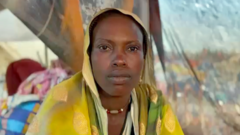Reports indicate widespread detentions, raising alarming concerns regarding the safety and rights of refugees in the region.
**Eritrean Refugees Fear for Their Lives Amidst Police Crackdown in Ethiopia**
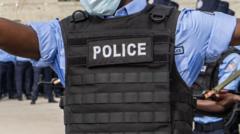
**Eritrean Refugees Fear for Their Lives Amidst Police Crackdown in Ethiopia**
Eritrean nationals in Ethiopia face escalating arrests and danger as authorities intensify their crackdown on the community.
In a disturbing escalation of an existing crisis, Eritrean refugees and asylum seekers in Addis Ababa, Ethiopia, are living in constant fear as police conduct widespread arrests within their community. Recent reports have shown that many individuals—some held for weeks or even months—are being detained entirely arbitrarily, reflecting a significant and troubling surge in police action.
The Ethiopian Human Rights Commission has announced intentions to investigate the situation amid claims that refugees are being targeted based on their ethnicity and language. An Eritrean man, who opted to remain anonymous, described a harrowing experience where he and friends were apprehended simply for conversing in Tigrinya at a café. Allegations of corruption surfaced, with claims that police demanded bribes for release, indicating a systemic abuse of power.
According to data, over 20,000 Eritreans have crossed into Ethiopia this year alone, joining the approximately 70,000 already recognized as refugees. Many fled Eritrea to escape oppressive military service and government repression, but now face persecution once again. One refugee shared the heart-wrenching story of his sister's recent arrest during an outing, highlighting the community's plight as they try to support those detained while fearing their own arrest.
With UN officials voicing their concerns, many Eritrean refugees are now contemplating perilous measures to exit Ethiopia. Reports indicate that some have even been apprehended while trying to secure travel documents, further amplifying fears regarding their safety in the country. The situation for Eritrean refugees, particularly at Alemwach camp in the Amhara region, has become dire, with frequent accounts of violence, robbery, and even murder.
This crackdown bears troubling similarities to historical events following the border war between Ethiopia and Eritrea, prompting fears of mass arrests reminiscent of that time. Overall relations between the two neighbors have soured significantly after Ethiopia's recent civil conflicts, and there is a stark lack of diplomatic engagement.
Refugees have made urgent calls to the international community, emphasizing the need for intervention from bodies like the UN and human rights organizations, as they describe the situation as increasingly perilous. Various accounts describe the arrests as not only unjustifiable but also indiscriminate, targeting both documented and undocumented members of the Eritrean community, leaving many wondering if they will find safety anywhere at all.
The Ethiopian Human Rights Commission has announced intentions to investigate the situation amid claims that refugees are being targeted based on their ethnicity and language. An Eritrean man, who opted to remain anonymous, described a harrowing experience where he and friends were apprehended simply for conversing in Tigrinya at a café. Allegations of corruption surfaced, with claims that police demanded bribes for release, indicating a systemic abuse of power.
According to data, over 20,000 Eritreans have crossed into Ethiopia this year alone, joining the approximately 70,000 already recognized as refugees. Many fled Eritrea to escape oppressive military service and government repression, but now face persecution once again. One refugee shared the heart-wrenching story of his sister's recent arrest during an outing, highlighting the community's plight as they try to support those detained while fearing their own arrest.
With UN officials voicing their concerns, many Eritrean refugees are now contemplating perilous measures to exit Ethiopia. Reports indicate that some have even been apprehended while trying to secure travel documents, further amplifying fears regarding their safety in the country. The situation for Eritrean refugees, particularly at Alemwach camp in the Amhara region, has become dire, with frequent accounts of violence, robbery, and even murder.
This crackdown bears troubling similarities to historical events following the border war between Ethiopia and Eritrea, prompting fears of mass arrests reminiscent of that time. Overall relations between the two neighbors have soured significantly after Ethiopia's recent civil conflicts, and there is a stark lack of diplomatic engagement.
Refugees have made urgent calls to the international community, emphasizing the need for intervention from bodies like the UN and human rights organizations, as they describe the situation as increasingly perilous. Various accounts describe the arrests as not only unjustifiable but also indiscriminate, targeting both documented and undocumented members of the Eritrean community, leaving many wondering if they will find safety anywhere at all.


